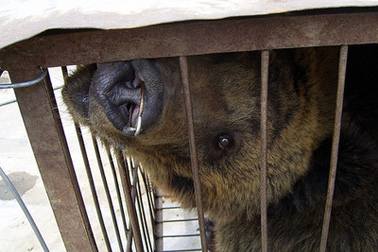 By TreeLiving
By TreeLiving
The demand for rhinoceros horns in traditional Chinese medicine has led not only to the poaching of the endangered animals, but the theft of horns from animals in museums. Bile from bears is also an ingredient used in Chinese medicine, as a fever suppressant. The bile is cruelly extracted from bears in cages via holes punched in their bodies, a “harvesting t echnique” that is approved by the Chinese government.
The Guardian reports that practitioners of traditional Chinese medicine are now joining with animal rights activists to call for an end to bear-bile farming.
About 242 types of medicine, including tanreqing for lowering fever in children, are produced from bear bile. The bear-bile industry is described as secretive though there are an estimated to 96 farms in China, with about 10,000 to 20,000 bears. One bear produces about 6 1/2 pounds of bile per year, which is worth about 12,000 yuan or just under $2,000 at wholesale prices, or more when marketed directly to hospitals and buyers. One company, the Shanghai-based Kaibao, is thought to take about half of all the bile.
Bear-bile farming began in North Korea in the 1980s before spreading to China and Vietnam. After an international outcry, it was banned in Vietnam in 2005 but has taken root in Laos, one of the poorest countries in southeast Asia. The Telegraph describes the conditions of the bears on one farm:
In the wild an adult black bear would roam across a territory 100 square miles in size, but here, in the Luang Prabang farm, they are confined in barred enclosures measuring 15 sq ft. Some of the animals cannot stand fully upright and some display the repetitive swaying movements of severe stress. Most also have mange, and scratch incessantly at their patchy fur. Despite the 100F heat outside, there is no water in any of the cages.
Disturbing as all this is to witness, these bears are luckier than others. In some bile farms the bears live with a catheter inserted into their gall bladder. To enable farmers to extract the bile without risk of attack, the animals are often confined in ‘crush cages’ so tight that they can hardly move at all. A bear in a well-run zoo or safari park can live for up to 35 years. Most bile-farm bears are unlikely to survive much beyond eight years, according to Free the Bears.
Gao Yimin, a professor at Capital Medical University, is quoted by the Guardian as saying that synthetic materials are similarly effective and even safer than bear bile, and that the cruel technique used to obtain it “actually reduces the effectiveness of the gall and is harmful to human health.” Toby Zhang, external affairs director of an NGO, cites research by Chengdu military scientists that “found that 100% of farmed bears were suffering from infections and other ailments despite being pumped full of antibiotics.” In addition, more than a third of the bears who are rescued die of liver cancer, meaning that the bile may contain carcinogens.
There are thousands of drug stores in China; about forty have agreed to stop stocking medicines made from bear bile and join campaign against its use. This support is a “major step forward,” as Jill Robinson, the founder of Animals Asia, says. She has been campaigning to end bear-bile farming since 1995. It remains unclear if the Chinese government will respond to the campaign, as Chinese authorities have a “long-standing desire to protect traditional medicine” and are concerned about the consequences of closing the industry, from finding “vast shelters or mass euthanasia” for the bears to new jobs for the workers.
But read the Telegraph‘s description of how the bile is taken from anesthetized bears and it becomes all too clear why bear-bile farming should be banned in Laos, in China and everywhere.

